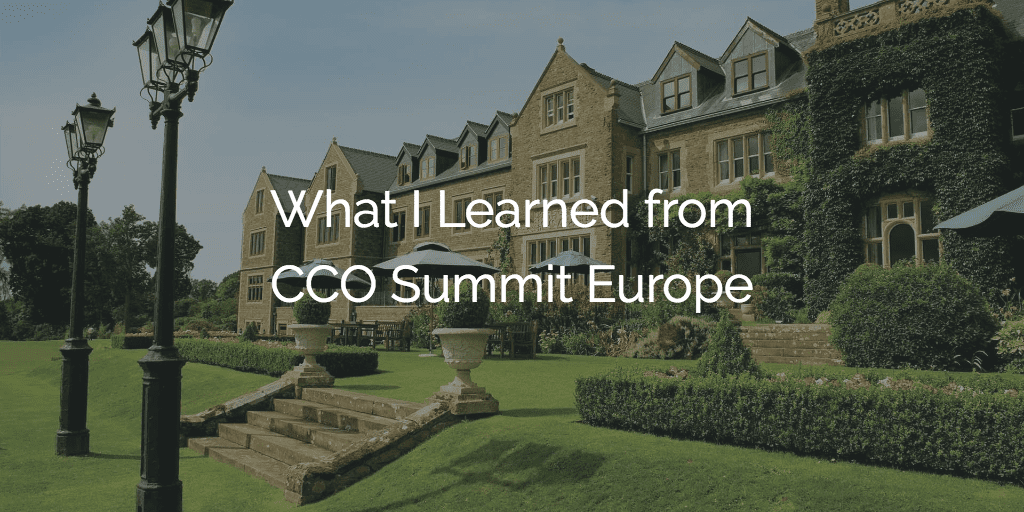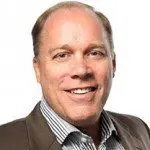We’ve done the Chief Customer Officer Summit, which we affectionately refer to as “CCO” four times in the US. It has been phenomenally successful, with our NPS ranging from 85 to 94 for those four events. So we decided to bring it to Europe last week and the results were no less amazing.
40+ leaders of Customer Success organizations around Europe made the trip to Horsham, UK for a one-and-a-half day event at the South Lodge hotel. Attendees included leaders from companies ranging from 20 employees and £2M ARR to 10,000+ employees and multi-billion pounds of turnover. This continues to be one of the more amazing things about Customer Success and this event in particular—there’s lots of common ground even between the people on the extremes of that spectrum. Oftentimes, the larger companies are more anxious to talk to smaller counterparts than to their peers because the changing landscape in the tech industry has turned the world upside-down, and the disruptors have expertise and knowledge that traditional companies are intensely interested in hearing.
CCO is an event unlike any other. There are no big-name speakers or expert panels to attract attendees. In fact, if you judged it only by the agenda, perhaps no one would come. But time and time again, we’ve found that something amazing happens when you bring the right people together to discuss topics that really matter to them. And that’s what we do at CCO. For that, I offer sincere thanks to those who attended this inaugural event, not because they saw the agenda and got excited, but because they trusted us when we said, “It will be well worth your while.”
So here are five things I learned, or re-learned, last week.
1. Right People + Right Environment = Magic
Bringing the right people together at a destination venue like South Lodge does something akin to magic. The environment and the safety of being with true peers opens up the conversation—a conversation that all are very thirsty for because Customer Success is still so new, and as we found, there is no single answer to virtually any of the big questions.
We enhance that experience by making CCO very non-commercial. We did have three great sponsors—Insided, N3, and ServiceSource—but there were no booths and no sales pitches. I even went through all of my own slides and removed the word “Gainsight” everywhere I found it. This conversation is about a movement and the philosophy of Customer Success, not about companies and vendors. We’re all in the room to learn from one another, not to listen to someone else telling us how to do it.
This is part of the magic—the safety of an event where no one is trying to sell anything. We’re all just trying to improve the Customer Success community. To take the non-commercial approach one step further, we also make sure that the emcee of the event is not a Gainsight person. Thank you Nicola Mann for taking on that role and executing it perfectly!
Last but not least in the discussion of what makes this event special is the size. It’s important to keep it small enough so that it does not lose the intimacy that makes it so valuable. In the US, we started with 50 attendees and over two years grew it to 200. But we realized 200 was too big and backed off to 150 in February. I’m not sure we know the ideal number, but we do know that it must be a relatively small group of hand-picked and personally-invited senior leaders.
2. Selecting Peer Groups Is Critical (and Hard)
A bulk of the time at CCO is spent in small groups (6-8 people). It’s critical to put those groups together thoughtfully, starting with making sure two competitors aren’t sitting around the same table. Nothing would eliminate safety and transparency quicker than that mistake.
So how to answer the question, “Who is a peer to whom?” This is mostly not about title, but about company. And the question is hard because of the variables from which you could choose peers:
- Size of company
- Size of Customer Success org
- Touch model
- ACV
- SMB or Enterprise customers
And that list goes on and on. And again, there’s no right answer. We created our groups this year by size of company, and generally that worked very well because we also gave enough space for every attendee to find time to chat with every other attendee. However, there was enough feedback for me to think about other possibilities next year. That’s because talking to others in a social situation is not the same as wrestling with a particularly relevant question from a business perspective. This leads me to my third learning.
3. The Right Discussion Topics Are Vital (but not Hard)
The way the small group discussions work is that we give them a specific topic or topics to discuss and come back with recommendations for the larger group. For example, the first topic on the table sounds simple, but despite giving them 90 minutes to discuss, we inevitably heard that it wasn’t enough time. The topic was “Who owns revenue in the recurring revenue world?” This is clearly a question that doesn’t have a textbook answer—and that’s the whole point. If there was a clear right answer, someone or everyone would have figured it out and the conversation would take five minutes and be very boring. As it stands today, the conversation is lively and animated and inconclusive. Oh, and also fun and extremely valuable!
One of the findings from this event as well as Pulse is always that people walk away reassured. Reassured that they are not alone, that they are not stupid, and that they are not five years behind the rest of the industry. There’s magic in that, too. Nothing bonds human beings together like shared pain. And each of these discussions highlighted shared pain. The relationships and friendships that are created by wrestling with hard things are truly priceless. I’ve seen lifelong friendships formed around a table at CCO.
There are so many relevant topics that selection was hard simply because of the myriad of great options. In addition to the revenue question above, we also debated:
- What’s the ideal Customer Success org?
- Compensation models
- Justifying Customer Success internally and externally
- Who owns the customer (as opposed to the revenue)?
And then the last time the groups got together for a discussion, we did a Dragon’s Den competition. Stephen Millard from Notion Capital and Joe Krancki from Frog Capital were kind enough to make the trip to Horsham and be Dragons for us. The topic on the table was this: If you had £1M to improve your world of Customer Success, would you spend it on Process or Product – choose one and then make your case for the £1M to the Dragons. Competition brings out very interesting behavior. The ad-libbing that went on in response to tough questions from the dragons was revealing and humorous. Everyone had fun and the winners walked away with Echo Dots.
4. Customer Success Is <Still> New
When I use the term “Customer Success” here, I’m talking about a true focus on customers, not because it feels good, but because it drives bottom line monetary value. This is still very new to most B2B companies, so although there are more and more companies and individuals who have been doing it for a while, they are dwarfed by the number who haven’t even started. And because it’s new, it is still ever-changing. Companies of every stage and size potentially need a different Customer Success focus.
At the extremes, it’s easy to see the differences. A company with one product and a company with 45 products are going to have to deliver Customer Success with very different models. Or think about the contrast between a company with 10,000 £40/month customers versus a company with 60 £2M/year customers. Philosophically, Customer Success may be the same for all four of those companies, but the execution in daily practice will not look alike in any way, shape, or form. Most companies will go through some stages in between these extremes which makes it extremely powerful to sit with someone at another stage and have that conversation. And the same topic next year with the same people talking about it may very well not sound at all alike.
Customer Success is a rapidly evolving discipline, and we saw a broad variety of principles and processes across the 40 companies in the room at CCO. This made for a fun and interesting conversation, but more importantly, it was highly valuable to everyone involved. We even developed an internal joke during the event that the answer to the ultimate question in the Customer Success universe is “it depends.” Kind of like “42” for those of you who are fans of “The Hitchiker’s Guide to the Galaxy.” The answers to the questions we posed and discussed do depend on a number of different variables. But despite that truth, we did discover a number of absolutes that do not depend. Most are not great revelations, but it was revealing and fun to uncover them:
- CSMs should be on a variable compensation plan
- Regardless of who transacts a renewal or an upsell, Sales and Customer Success MUST be aligned
- Gross Revenue Retention (GRR) is a key measurement of Customer Success no matter the model
- Measuring advocacy in some way is important; NPS is the de facto standard for doing so
- Technology has to play a key role in driving productivity and effectiveness
5. Fun Never Gets Old
For those who aren’t familiar with Gainsight, one of our five core values is “Childlike Joy,” and we make an effort to bring it to everything we do, especially our events. In fact, we’ve been accused of going too far in that direction at previous CCOs. We’re always willing to back off if necessary, but we’ll never back off completely. It’s too important to our culture, and I believe our attendees at all of our events now expect it and would be disappointed if we didn’t deliver.
A few observations from our moments of childlike joy at this CCO Summit.
- Even a simple five-minute contest to see who can build the best castle out of plastic cups brings out the competitive instincts in a group of type-A personalities.
- Most successful people have skills beyond their business skills. In the course of our event we discovered that the best foosball player in the Customer Success world is a woman from Amsterdam, and the best ping-pong player is a young man from the Czech Republic. We also determined that the search for a decent golfer in the Customer Success world will have to continue. One comment that I thought summed up all of the talents we saw was “tell-tale signs of misspent youth”.
- Very few people are very good at karaoke, but everyone loves it.
- Gainsight does not have exclusive rights to taking popular songs and re-writing the words with Customer Success themes.
- All attendees of CCO Summit Europe 2018 were quite pleased to have the following royal title bestowed on them upon departure:
The Right and Honourable Graduates of the
Inaugural CCO Summit Europe in the Year of our
Lord 2018, Accelerators of the Movement, and
Honorary Knights of the Order of Customer Success
Thank you to all of those who attended our inaugural event and to the facilitators and sponsors who helped us and allowed us to execute on our unique vision successfully. Hope to see all of you back next year with a few newcomers, too!

